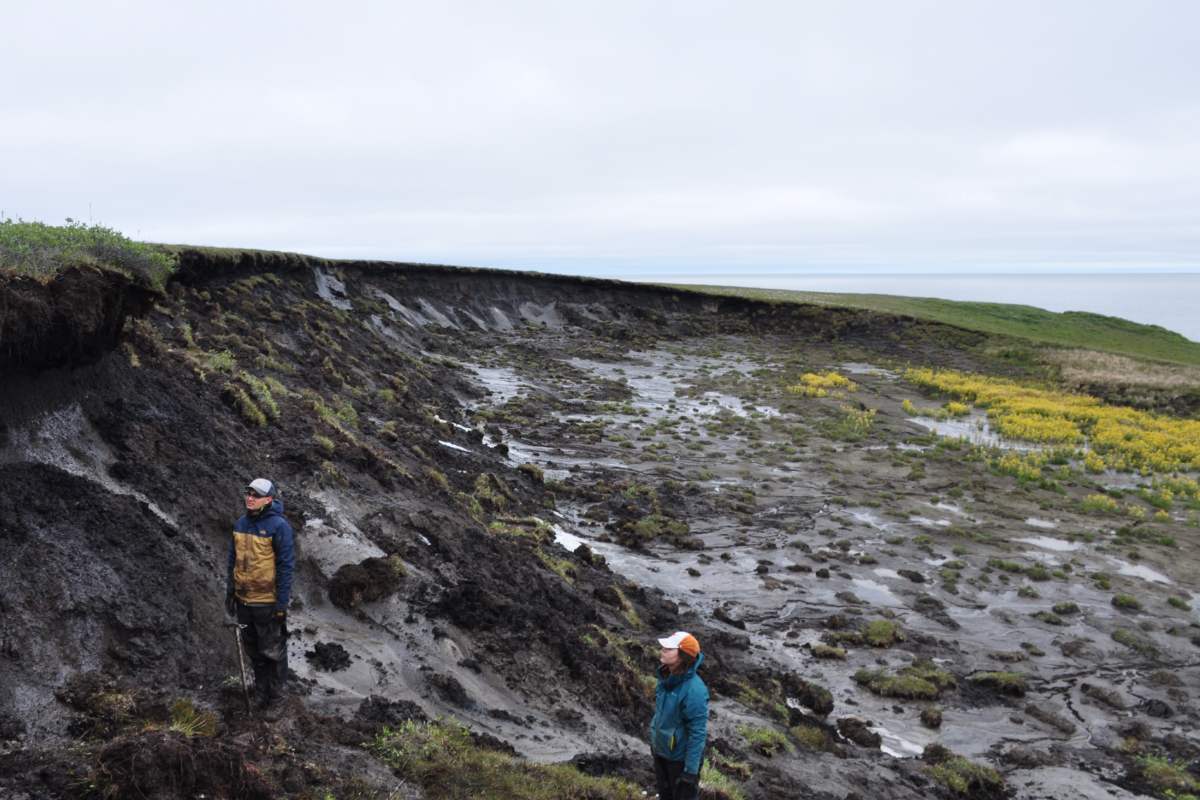
Permafrost thaws, or slumps, like this one are increasingly common as temperatures in the Arctic reach record highs not seen in 10,000 years. Photo credit: Duane Froese
A new study by Canadian researchers is highlighting alarming rates of climate warming and thaw of permafrost in Northern Canada, finding that Arctic temperatures are the warmest in more than 10,000 years.
"We've known that the last few decades have been very warm," said Duane Froese, co-author of the study, professor in the Department of Earth and Atmospheric Science, and Canada Research Chair in Northern Environmental Change. "But we've found that temperatures are on the order of two degrees celsius warmer than any time in the last 10,000 years-that was a surprise."
And a sobering surprise, at that. Frose explained that our current 10,000 year high has seen permafrost thaw across the Arctic increase rapidly, destabilizing soil carbon, which may further accelerate warming.
"We're seeing evidence right now that climate warming is destabilizing permafrost in Northern Canada and releasing greenhouse gases. This is potentially the new normal, and if it accelerates in the near future, it threatens to further amplify global climate change." said Trevor Porter, lead author on the paper and Assistant Professor at the University of Toronto-and formerly a postdoctoral fellow supervised by Froese.
"All indications from this new study are that temperatures and the impacts of recent warming are only picking up and getting stronger," said Froese. "We are moving into uncharted waters with respect to climate change in the north."
Highest temperatures in 10,000 years-and climbing
The study examined permafrost and found that previous record highs occurred during the early Holocene-about 9,900 and 6,400 years ago. But even without the unique circumstances of that period, current Arctic temperatures have exceeded those records.
"This period, called the early Holocene thermal maximum, occurred when the earth's axis was more strongly directed toward the sun. This was a time when permafrost was degrading rapidly," said Froese. "This new study shows that temperatures today are even warmer than they were during this period and so we should expect that the recent impacts of warm temperatures are just the beginning of the rapid thawing of permafrost across the North."
The rising temperatures have had implications across northern Canada already, with other recent studies reporting record levels of mercury released by thawing permafrost, a 6000% increase in landslides, or slumps, caused by thawed permafrost on Banks Island, and a report that Canada is warming at twice the global rate.
"The impacts of warming across the north are being felt at an alarming rate and this study provides further evidence that we are well beyond anything our planet has known in the last 10,000 years," said Froese. "Clearly, we need to come to terms with the impacts of these warmer temperatures and consequences for northern communities, infrastructure and lifestyles."
The University of Alberta's participation in the study also included work by graduate students Sasiri Bandara and Lauren Davies, supervised by Froese.
The paper, "Recent summer warming in northwestern Canada exceeds the Holocene thermal maximum," was published in Nature Communications(doi: 10.1038/s41467-019-09622-y).